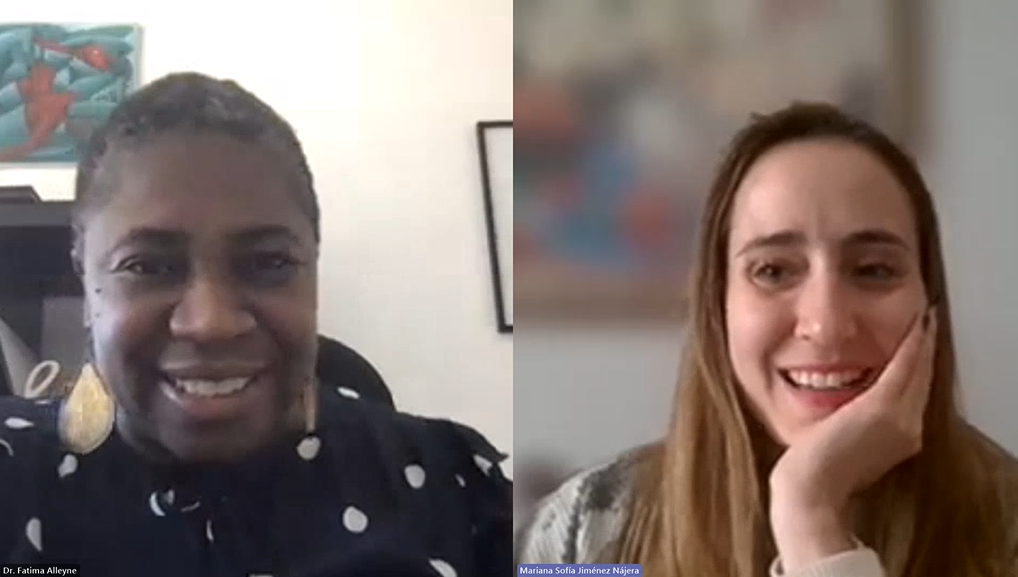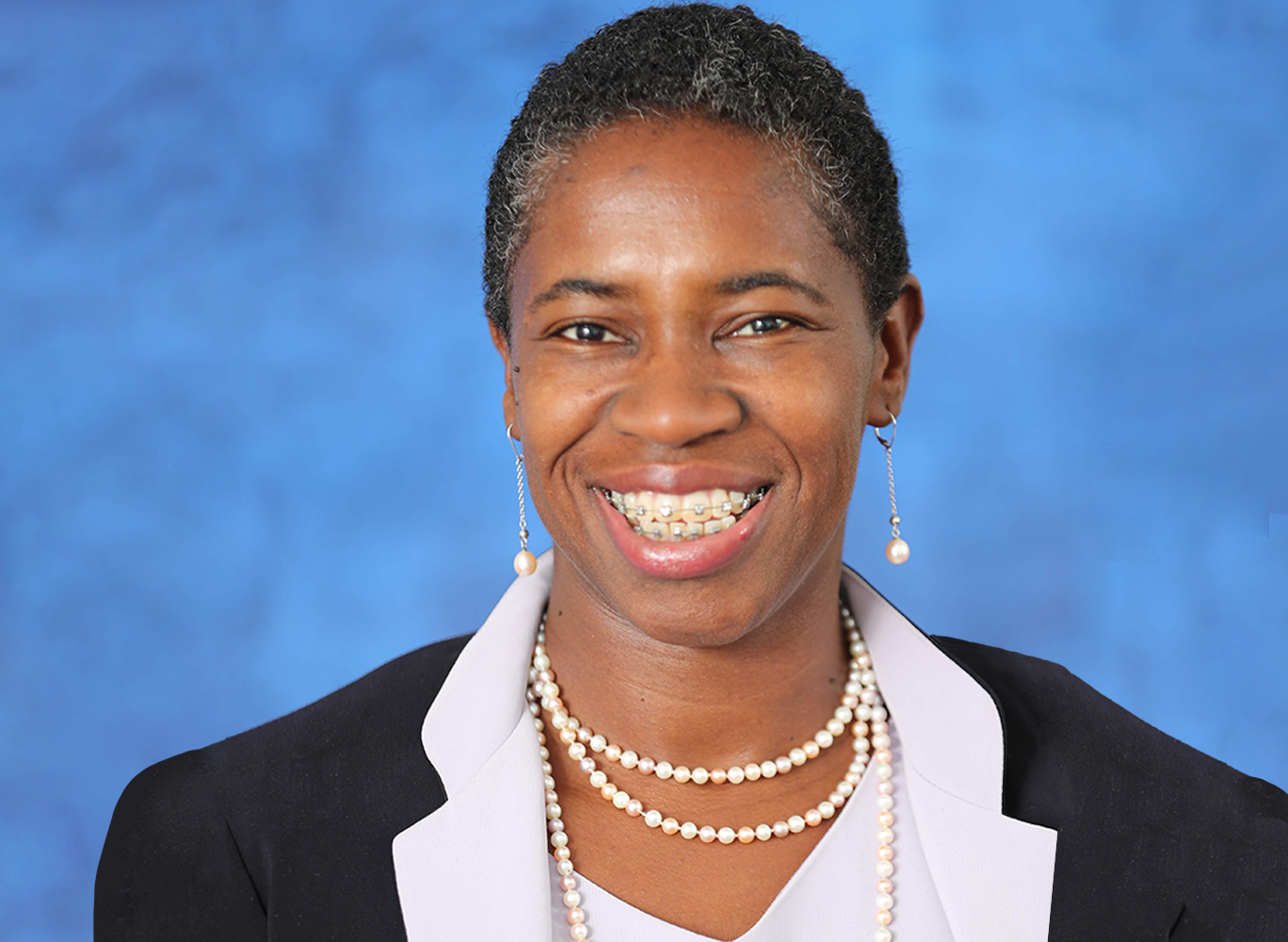International Day of Women and Girls in Science was celebrated on February 11, and the upcoming Women’s Day (March 8). I needed to commemorate these crucial dates through Fatima Alleyne’s remarkable experience as a woman in the STEM field. Dr. Alleyne was a panelist during the WEEF & GEDC Conference 2023 held at the Tecnológico de Monterrey facilities. Her words about women in the engineering world surprised me, moved me, and inspired me to learn more about her trajectory and struggles. Besides being a woman with a fantastic career in engineering, she is a mother of four and runs her own business.
With her cheerful presence and confident and determined approach to her career, Fatima is also a mother who owes her success to prioritizing her family and maintaining the balance between it and her work.
Fatima Alleyne, Ph.D., has worked in the education sector, from preschool to university and non-profit educational institutions. In 2013, she became the first African-American woman to graduate with a Ph.D. in Materials Science and Engineering from the College of Engineering at UC Berkley. Then, in 2018, she served as President of the Contra Costa County Board of Education (the first African-American person to be selected for the position). Fatima runs her consulting firm, BeyondDEIBA, which is dedicated to helping institutions leverage engineering principles to integrate equity, diversity, and inclusion values into their missions, particularly emphasizing STEM and healthcare.
Fatima says that as an African-American woman, she was inspired by opening the doors of education to all people regardless of race and background, an extremely daunting task that represented confronting obstacles since the beginning of her academic life. However, the words instilled in her by her grandfather propelled her to pursue more advanced studies and have a successful career: “They can take everything away from you, but they can never take away your education.”
“I wanted to create experiences for people who didn’t have access to education. I didn’t want other people, whether you’re Latino, you’re Indian, you’re African American, I didn’t want them to experience what I experienced. I wanted people to experience diversity, belonging, and access. And that’s why I chose the path that I chose.”
– Fatima Alleyne.
Alleyne had four children while going through the critical stages of her academic journey as a student. During this time, she received strong criticism from people close to her, family, and fellow faculty members for “not being fully committed to her career by having children.” This made Fatima question the path she had envisioned for herself, where the birth of her children represented a lack of commitment and significant detours, changing her life completely.
However, Fatima remarked that it was crucial not to doubt herself nor yield to other people’s definitions of obstacles or anything else they found non-traditional. “I’m choosing to do both, and I’m choosing to do it my way,” Fatima says. Other people’s discomforts should not impact how someone wants to achieve their goals and aspirations; she emphasizes “not letting other people define who I am because of the choices that they disagree that I made.”
The duality of professional and family life
Not every work environment makes it easier for women and mothers to carry out their personal matters peacefully. Throughout her many career experiences, Fatima worked in both pleasant and hostile workplaces. She says that when working these jobs, the hardest thing to overcome, besides all the injustices, discrimination, racism, and inequity she faced, was being consumed by negative feelings that she inevitably brought home. These began to affect her family relationships so much that even her marriage was on the verge of divorce, and that was when she realized that something must change. With her husband’s support, she could solve her problems and move steadily toward her goals, achieving all that she considered invaluable. “He wanted me to be the woman that he knew I was and didn’t want the employment opportunity to take so much from me. Saying no is also part of it, and really staying true to what brings me joy.”
Fatima commented that during these difficult times, a reminder of the inequities, racism, and discrimination led to bodily responses that were detrimental to her health and life. Her social, emotional, and mental wellbeing were affected, so she emphasizes that being aware of the indicators your body is giving and recognizing harmful responses such as high blood pressure, anxiety, or depression is highly important. Either way, after working for several hostile workplaces, she had to work on herself and lean on her husband and therapists’ support to get through such experiences.
For her, being a mother and an engineer requires a clear distinction between work and motherhood. On one hand, in the work field, any person is replaceable; anyone may not even be in the grave or cremated, and their job position would be already posted on hiring platforms. On the other hand, a child’s mother is an irreplaceable figure in their lives, and no one else can occupy their role.
Fatima thinks that limits should be established so that one’s professional life does not interfere with one’s personal life and vice versa. The work environment must change to value people’s experiences and skills, not detrimentally impact their personal lives. “Our workforces need to recognize that for me, as a woman, my priority is my family, and the workforce is an opportunity for me to leverage my skills and expertise for the advancement of the organization’s mission, and such opportunity helps me to support my family and hopefully make an impact if I’m in the right place.”
However, she points out that it is challenging for a mother to say no in many work situations. For instance, according to INEGI, in 2023, 7 of every 10 Mexican mothers were economically active; for many of them, it is not an option to refuse a job opportunity or quit their current job given their economic needs to support their family, even less so if they are single mothers.
So, under these circumstances, what can a mother do if she cannot easily quit her job? Fatima recommends overcoming shyness and connecting with other people. Whether it be spending lunchtime with a coworker or joining clubs or classes on any hobby, even going for a spontaneous walk in a park can be helpful not only to meet new people but also to get physically active.
“What I’ve learned is that I have so many talents, skills, expertise and competencies that I don’t have to restrain myself and define myself in any one way.”
– Fatima Alleyne.
Expanding your network is essential: attending conferences and contributing to a non-profit organization can help counteract the negativity of your current job. Creating a space for your talents and abilities to shine will attract positive things, like meeting someone who can direct you to a new job or having the satisfaction of positively impacting yourself or others.
Another way of remotely networking is through digital employment platforms such as LinkedIn and Indeed, keeping an updated resume, and frequently interacting with people or posts. Connecting (whether in person or online) is vital to finding a new opportunity that improves a mother’s working conditions, both to benefit her family’s wellbeing and boost her talents in the workplace.

Motherhood: a powerhouse in the workplace
Unlike the norm in the professional field, motherhood comes with various competencies, which should be considered positive rather than underestimated when applying for a job. The most important is what Fatima calls code-switching, i.e., quickly adapting to different environments. “So code-switching, which is what I call it, is really an opportunity for me to create some safety for myself. And it’s an asset. Being versatile, and being able to adapt to your environment is a life skill. It’s a necessary skill. Some see it as a deficit. I leverage it as a skill, a competency. Because not everybody can adapt to a different environment.”
Fatima’s academic skills are a valuable example to compare with the above: she is a professional engineer specializing in diversity, equity, and inclusion, as well as a specialist in education, advocacy, policy writing, ethical practices, grant proposal development, project management, and leadership development. Each of these competencies have been interwoven through her different jobs. What she has learned as an educator, engineer, and researcher has been valuable transferrable knowledge she could use in different scenarios. The same can be said for the skills mothers develop at home.
“I have a lot of jobs. A chauffeur, a tutor. I do it all. What can’t I do?”
– Fatima Alleyne.
Gender roles that have been imposed on women throughout history may block women’s internal barriers, as well as reinforce their impostor syndrome. Fatima says that even though she is an engineer, within her home, she sometimes waits for her husband to perform specific tasks considered male-only: making home renovations and fixing a broken-down car, among others. However, when she realizes she has the necessary skills to perform a specific task, she proceeds regardless of gender roles. In this case, her engineering skills can also be applied at home. So, why shouldn’t the inverse be possible, using home knowledge to enrich people’s careers?
Being a mother should not get in the way of people’s academic and work goals. Fatima is a living example of this, working in different fields where she has been able to shine because of her experiences and skills, where being a mother was not an impediment but another competency for success in a professional career.
Finally, Dr. Fatima Alleyne advises us: “Be true to yourself. Just know that you bring value, expertise, skills, and talents, and not every organization, business, company, or employer is worthy of your talent. Choose yourself, your health, your wellbeing, and if you want to adapt and be agile and flexible.”
Translated by Daniel Wetta
This article from Observatory of the Institute for the Future of Education may be shared under the terms of the license CC BY-NC-SA 4.0 
)
)


)